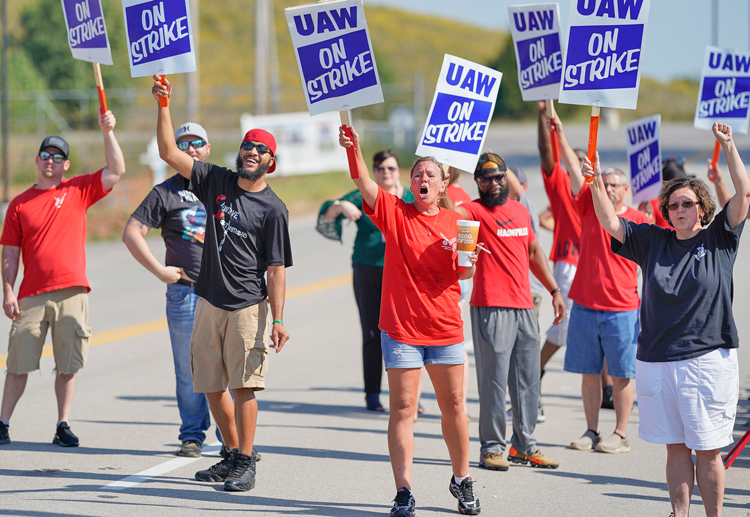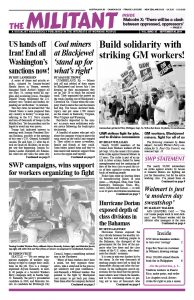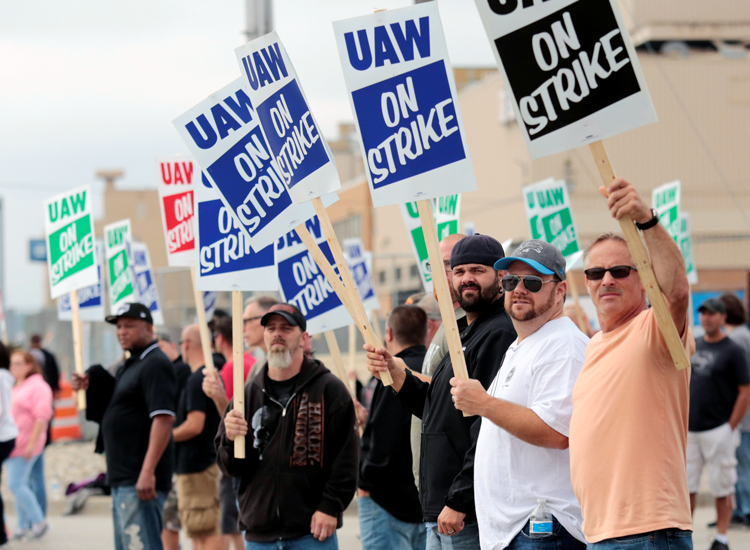Nearly 50,000 members of the United Auto Workers walked off the job Sept. 16 in the union’s first nationwide strike against General Motors in 12 years. The strike is part of an uptick in labor actions fueled by lower unemployment and the continuing efforts of the boss class to push the crisis of their capitalist system onto the backs of working people.
Picket lines went up shutting down 33 manufacturing plants in nine states — Michigan, Ohio, New York, Kentucky, Tennessee, Texas, Missouri, Indiana and Kansas — as well as at 22 parts distribution warehouses across the country.
The unionists’ four-year contract expired the day before, with GM bosses claiming they need further concessions from workers to meet nonunion competition. The company, which made $35 billion in profits in the U.S. over the last three years, is demanding workers pay more for health care coverage.
Workers are demanding an end to the two-tier wages system, imposed by GM in 2007, in which it takes eight years for all new hires to approach the pay scale of permanent employees and who get a riskier 401(k) retirement deal, versus a regular workers’ company pension. Another key issue is fighting for the growing number of even worse-paid temp workers to become regular GM employees.
Today’s highly profitable GM was a product of their 2009 bankruptcy, implementing a plan cooked up jointly with the Barack Obama administration. The “solution” involved splitting the company into two parts — “NewCo,” to be made up of the “good” GM, which involved keeping in operation Chevrolet, Cadillac, GMC and Buick; and “OldCo,” officially named Motor Liquidation Inc., which allowed the bosses to dump the Hummer, Saturn, Saab and Pontiac brands and their workers and pensions. The “new” GM exited bankruptcy in just 40 days with a $50 billion government bailout.
For the remaining workforce it meant job cuts, two-tier wages and elimination of defined pension benefits.
This type of scheme has been imitated in a number of coal company bankruptcies in recent years, including the one that created Blackjewel.
Plant closures create ‘gypsies’
Another key issue is the bosses’ decision to close plants in Lordstown, Ohio; Baltimore; and in Warren and Hamtramck, Michigan.
A number of striking GM workers at the company’s Parma Metal Center outside Cleveland told the Militant that they call themselves “GM gypsies” because plant closures have forced them to move more than once. One worker named Gerry said he had worked at Lordstown until this March when bosses “idled” the plant. He said he is now considered a “seniority temporary worker.” He had moved to Ohio after GM shut down the plant he worked at in Trenton, New Jersey. Now, he said, he’s been told he’s being forced to move to GM’s Bowling Green, Kentucky, plant.
“The company abuses temporary workers,” he said, to the agreement of other picketers.

Union officials picked GM as the first of the “Big Three” auto companies to strike — the most profitable — to set a “pattern.” They granted temporary contract extensions to Ford and Fiat Chrysler, but many of those workers have been joining GM strikers’ picket lines. And the strikers have been getting broader solidarity and support from working people.
Since the onset of the capitalist financial crisis in 2007, UAW officials have promoted a series of concession contracts with GM, Ford and Fiat Chrysler, claiming they were necessary to keep the companies alive and competing against foreign rivals. These contracts cut wages, opened the door to deep two-tier pay systems and the increase in temporary workers.
“We have given away so many concessions over the last eight-plus years, and this company has been ridiculously profitable,” 24-year-old second-tier Hamtramck plant assembler Chaz Akers told the New York Times Sept. 16. “That’s why we’re here. We’re fighting to get everything that we lost back.”
Akers said he gets $18 an hour to install passenger-side headlights, while the lights on the drivers’ side were installed by a temporary worker getting $3 less. “That guy has been a temp for two and a half years,” he said. “Is that temporary to you?” Workers hired before 2007 get $31 an hour.
Workers at Ford and Fiat Chrysler — and at other plants across the country — are watching the strike carefully. “People here are ready to fight to get rid of the tiers,” rod shop assembly line worker Brian Gulley at the Ford Assembly plant in Chicago told the Militant as he went into work Sept. 15. Workers there are members of UAW Local 551. “We need equal pay for equal work. We need wage increases.”
Forklift driver James Fischer said he thought “people in this country need to stand up for our rights. Look at what they have been doing in Hong Kong.”
Workers at the Ford plant bought 27 copies of the Militant at the shift change.
Autoworkers are following other fights as well. Alyson Kennedy, Socialist Workers Party candidate for president in 2016, and Malcolm Jarrett, SWP candidate for Pittsburgh City Council, visited the UAW picket line outside GM’s Bedford, Indiana, plant Sept. 16. They were on their way to bring solidarity to coal miners camped out on rail tracks outside the bankrupt Blackjewel mine in Cumberland, Kentucky, who are blocking their former bosses from moving a coal train out until they are paid in full for wages stolen from them.
Kevin Hutchinson, president of UAW Local 440 at Bedford, told Kennedy he was following the miners’ fight. He gave her a message of solidarity to take to the camp, saying, “I support them 100%.”
GM bosses have claimed the auto strike won’t hurt them so much because they’ve got vehicles stockpiled to supply dealers for months. But they fail to mention that Teamsters union truck drivers who deliver the cars are refusing to cross the UAW picket lines and won’t haul any GM products.
When GM workers walked out they joined some 850 UAW Aramark-employed maintenance workers who went on strike at midnight Sept. 15 at five GM facilities in Michigan and Ohio. They had been working under a contract extension since March 2018. Key issues are wages, health coverage, vacation time, job security and pensions.
Gov’t political cops help auto bosses
GM bosses are taking maximum advantage of a series of raids and arrests of UAW officials and staffers in an “investigation” of corruption aimed at smearing and weakening the union.
Two days before expiration of the UAW’s contract with General Motors, federal police arrested Vance Pearson, director of UAW Region 5. He was charged with embezzlement, fraud and money laundering. Two weeks earlier FBI and IRS agents raided the homes of UAW President Gary Jones and former UAW President Dennis Williams, as part of a nationwide sweep of sites tied to the union.
Williams “was held at gunpoint, ordered to lie down and handcuffed” after federal agents arrived at his California home, reported the Detroit News. He was outside smoking a cigar when they barged in.
“GM is outraged and deeply concerned by the conduct of union officials as uncovered by the government’s investigation and the expanding charges revealed today,” GM bosses hypocritically proclaimed in a Sept. 12 statement. “There is no excuse for union officials to enrich themselves at the expense of the union membership they represent.”
The big-boss press has gone further. “Blame Strike on UAW Corruption,” blared the headline on the Detroit News editorial Sept. 16.
From bosses who have profited off the backs of the workers for decades, their crocodile tears are an outrage. The FBI and other government political police agencies have no business interfering in the affairs of the unions. Whatever problems union members face are purely their own internal matters.
The capitalist rulers’ campaign has nothing to do with concern about corruption in the union. Their entire system is corrupt and immoral. Their goal is to undermine and weaken the unions and the fighting capacity of the working class.
Opposing all government intrusion into union affairs is essential for transforming the unions and building them as an independent fighting force. “Bureaucratic rule over the unions must be broken — and rank-and-file control established — without yielding an inch to the capitalist government,” wrote Farrell Dobbs, then national secretary of the Socialist Workers Party, in the Militant in February 1967. Dobbs was a central leader of the 11-state Teamsters union campaign that organized tens of thousands of over-the-road drivers into the union in the 1930s.
“Defense of workers’ democracy must also include a fight for unconditional independence of the unions from government control,” he wrote. “Central to that fight must be a complete break with the Democratic Party of big business and the political arming of the workers to carry the class struggle onto the government plane through their own independent party.”
The bosses are afraid that working people, fed up with their attacks, now look to organize to fight back. There have been some significant strikes since teachers in West Virginia began a number of school workers’ actions across the country last year, including at Marriott hotels and Stop & Shop.
Support the GM strikers!
Alyson Kennedy in Bedford, Indiana, and Naomi Craine in Chicago contributed to this article.


